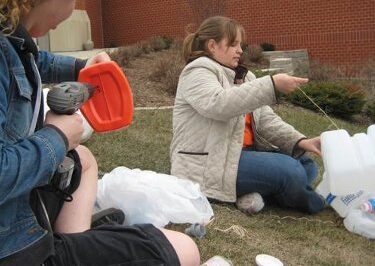
Organized by Renewal, a student-led creation care movement, the day of service provides opportunities for participants to lead education campaigns, plant trees and gardens, organize recycling drives, and partner with conservation groups to clean up streams and illegal dumps, as well as engaging in other activities.
“We said, ‘Let’s put our faith into action here and get our hands dirty to create a better environment in our local community,'” said Anna Jane Joyner, co-coordinator of Renewal and the daughter of MorningStar Ministries founder Rick Joyner. “So that’s what we encourage folks to do.”
“It’s basically being the hands and feet of Jesus, serving our neighbors and creation,” added Ben Lowe, who coordinates Renewal with Joyner and is the author of Green Revolution: Coming Together to Care for Creation. “We do a lot of talking about creation care, but we want to actually do it, and this is a way to encourage that.” .
Launched in October with 55 students and recent college graduates, Renewal is active on 35 campuses across North America. Dedicated to fulfilling their mission of prayer, service and activism, Renewal students participated in a day of prayer for the environment last fall. And this spring they launched a campaign to send postcards to the White House Office of Faith-Based and Community Partnerships, asking director Joshua DuBois to make creation care a priority. So far, 1,000 postcards have been sent.
Joyner and Lowe will spend today at Montreat College in North Carolina, leading a creation care awareness event and helping clean a stream in Montreat’s Black Mountains. They say taking care of the environment is not only a social responsibility but also a biblical mandate.
“The first commandment in the Bible was to Adam, where He instructed him to take care of My garden,” Joyner said. “To blatantly ignore the first command in the Bible doesn’t seem like a good way of doing business if you’re going to call yourself a Christian and you’re going to call yourself a Christian community.”
Joyner said many Christians don’t know much about environmental issues, and when their awareness is raised they typically want to act. She said visiting New Zealand while a student at the University of North Carolina opened her eyes to the damage being done to the planet and even motivated her to change her major to environmental communication.
“I think a lot of it was being exposed to the issues,” Joyner said. “Not knowing where our resources come from, where our waste goes. It really was a striking thing for me, and it certainly made me want to educate people to think about how we treat the world around us and how that contributes to how we treat the people around us.”
Lowe said many of the world’s major crises-from pollution to water and energy shortages-have environmental roots. Although Renewal is not focused on political lobbying, students are encouraging Christians to speak out for those who have no voice.
In recent months Renewal has joined with the creation care ministry Restoring Eden in advocating for clean energy policies. They are also speaking out against a form of surface coal mining that removes the tops of mountains to reach coal seams and dumps the remains into nearby valleys, polluting area streams and rivers.
“It’s often the poor that bear the environmental cost instead of other folks,” Lowe said, “so it’s those injustices that need to be addressed and healing that needs to take place.”
Renewal was founded at a time when many church leaders continue to question claims that the earth is warming. A recent LifeWay Research study of more than 1,000 Protestant pastors showed that 47 percent strongly or somewhat agreed that global warming was real and man-made. The exact same percentage of pastors strongly or somewhat disagreed that global warming was occurring and was man-made, while another 6 percent was unsure.
The division becomes more apparent when pastors are categorized by denomination, location and political ideology. Three-quarters of pastors in mainline denominations believe in global warming and chalk it up to human actions. But among evangelicals, that number drops to 32 percent. In larger cities, 55 percent of pastors agree that global warming is real, whereas 43 percent of rural pastors adhere to this belief. Pastors who consider themselves politically liberal were almost three times as likely as conservative pastors to think global warming is both a real and a man-made problem.
“Protestant pastors are split on the issue of man-made global warming, and their views impact their communication,” LifeWay Research director Ed Stetzer told Baptist Press this week. “Mainline clergy answer the question with similar numbers to self-identified Democrats and liberals in surveys of the general public. Evangelical clergy answer the question in similar percents to Republicans and conservatives. At the end of the day, Protestant pastors are as divided as Americans are on the issue of global warming.”
The division mirrors an ongoing tension among Christian leaders over environmental issues. Last May, Family Research Council President Tony Perkins and Southern Baptist leaders were among a group of prominent evangelicals to endorse the “We Get It” campaign. Although the effort supported creation care, it warned against “speculative” claims about man-made global warming.
In 2007, a group of evangelical leaders, including Focus on the Family founder James Dobson, called on the National Association of Evangelicals to remove Richard Cizik, then vice president of governmental affairs, for his “relentless campaign” affirming global warming. Cizik resigned in December after saying in an interview that he supported civil unions.
Lowe said many Christians see the environmental debate as a political rather than a spiritual issue. “It’s no mystery right now that when you think of environmental positions and policies you end up thinking of the Democratic Party more often than not,” Lowe said.
But he said the debate “can’t be a red or blue thing; it has to be about God and about our faith before Him. I think Christians in the United States, we’re waking up a lot more.”









Leave a Comment
You must be logged in to post a comment.